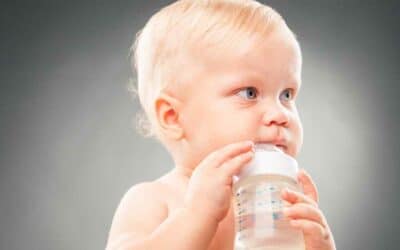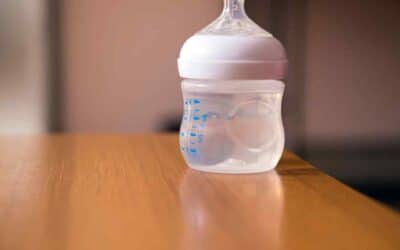Introducing a baby to a new phase of dietary intake can be an exciting yet meticulous journey for parents. When babies are around six months old, and as they make the gradual transition from a liquid diet to incorporating more solid foods, it is crucial to introduce water to their diets. This article underscores the importance of this fluid in aiding digestion, maintaining hydration, and supporting the overall growth and development of an infant.
Water is a fundamental component of our diet, as it supports numerous bodily functions such as nutrient absorption, digestion, and elimination of waste products. However, introducing water to infants is not as simple as it might seem, as it involves careful considerations regarding the right time, the appropriate amount, and the suitable type of water, to avoid any adverse effects on their delicate systems.
This article aims to guide new parents through the process, offering insights into when and how to introduce water safely, ensuring babies reap the benefits of this essential liquid while avoiding complications such as water intoxication or imbalances in electrolytes. Whether you’re a new parent or looking for more information, this article provides a comprehensive overview of integrating water into your baby’s growing diet.
When to Introduce Water
When babies make the shift from relying solely on breast milk or formula, the introduction of water becomes a pivotal part of their dietary expansion. The American Academy of Pediatricsand numerous child health organizations lay out specific guidelines regarding when and how babies should be introduced to drinking water. It’s essential to adhere to these guidelines to maintain the balance of electrolytes in their bodies and avoid complications like water intoxication, ensuring the baby gets all the nutrients and hydration needed for healthy growth and development.
Recommended Age
The general consensus among pediatricians is to introduce water to babies around 6 months of age, which usually coincides with the introduction of solid foods. Introducing water to babies younger than this is not recommended as it can lead to an imbalance in electrolytes and can fill up their small stomachs, causing them to take less breast milk or formula, which are crucial sources of nutrients. Additionally, too much water can lead to water intoxication, a serious condition that can occur when the balance of electrolytes in a baby’s body is disturbed by a large intake of water.
Signs of Readiness
Parents should observe for signs indicating that the baby is ready to start drinking water. One of the initial signs is the baby’s ability to sit up and hold their head up independently. Another sign is the decrease in the tongue-thrust reflex, which makes young babies push food out of their mouths. Moreover, increased interest and engagement with solid foods also signify readiness. The introduction of water should ideally complement the baby’s consumption of solid foods and should not replace regular milk feeds of breast milk or formula.
Practical Considerations
Sippy Cup and Straw Cup Introduction
- Introducing a sippy cup or a straw cup can help in developing cup drinking skills.
- Start with offering small sips or a few sips during meal times and gradually increase the amount.
Type of Water
- Tap water is usually suitable; however, it’s crucial to consult with the local health department about water safety or opt for boiled or bottled water if necessary.
- Avoid sweetened, sparkling, or caffeinated drinks. Stick to plain, unflavored water to foster healthy habits early on.
Quantity
- Begin with a few sips and gradually increase, paying close attention to how much water the baby drinks to avoid displacing intake of breast milk or formula.
- Monitor for adequate wet diapers or nappies to ensure the baby is staying adequately hydrated.
Additional Liquids
- While water and milk should be primary, undiluted fruit juice and other drinks can be introduced sparingly after 6 months to avoid tooth decay.
- All other drinks, including cow’s milk and diluted fruit juices, should be limited, and water should be the go-to choice for staying properly hydrated once solid foods are introduced.
Hot Weather and Illness
- In hot weather, babies might need additional fluids, so offering more frequent sips of water can help keep the baby hydrated.
- Consult the child’s pediatrician about water intake during illnesses, as hydration needs may vary.
Amount of Water
In the journey of introducing baby water to your baby’s diet, understanding the appropriate quantities is as crucial as knowing when to introduce it. Once a baby has started eating solid foods, around the 6-month mark, water becomes a necessary addition to their diet to aid digestion and keep them hydrated.
Here, we discuss the recommended starting amounts and the maximum limit of water intake for infants, focusing on achieving a balanced intake to support their growth and well-being.
Starting Amounts
1. Initial Intake
Parents should commence with small quantities, offering about 1-2 ounces of water per day to babies who have started eating solid foods. This minimal amount will not hinder the absorption of essential nutrients from breast milk or formula.
2. Gradual Increase
As the baby grows and gets accustomed to drinking water, parents can gradually increase the amounts. Keeping track of other liquids consumed, such as infant formula or breast milk, can aid in adjusting water intake appropriately.
Maximum Limit
1. Staying within Limits
It is paramount to stay within the recommended daily water intake to prevent water intoxication, a condition where an imbalance in electrolytes occurs due to excessive water consumption. Parents should ensure that the baby drinks enough fluids without exceeding the safe limit.
2. Adjusting Water Intake
The baby’s consumption of other liquids like breast milk or formula must be considered when offering water. If a baby is primarily infant formula fed, the water used to mix formula also contributes to their daily fluid intake. Adjustments should be made to avoid displacing vital nutrient sources.
Practical Considerations
1. Type of Water
Offering plain tap water is usually adequate, but if there are concerns regarding water quality, parents can opt for boiled or bottled water. Adding sweeteners or flavors like chocolate powder is discouraged as they can lead to tooth decay and unhealthy eating habits.
2. Signs of Adequate Hydration
Monitoring the frequency of wet diapers or nappies can give insights into whether the baby is getting all the hydration they need. Dry mouth and a lack of tears when crying can be signs of dehydration, necessitating a consultation with the baby’s pediatrician.
3. Encouraging Healthy Drinking Habits
Introducing water in an open cup or straw cups can foster good drinking habits from a young age. It’s essential to avoid sweetened drinks and emphasize the importance of water once the baby is introduced to table food.
4. Consultation with Pediatrician
For any uncertainties regarding how much water is suitable, parents should maintain open communication with the baby’s pediatrician. They can provide tailored advice considering the baby’s age, dietary intake, and overall health, ensuring the baby stays properly hydrated and nourished.
Conclusion
Navigating the waters of introducing this vital liquid to your baby’s diet can be intricate but immensely rewarding. The journey, beginning at around six months, when solid foods are introduced, is laced with precision and vigilance, ensuring that the baby reaps all the hydration and nutritional benefits from water, breast milk, or infant formula without any adverse effects.
Remember, every baby is unique; hence the signs of readiness and the right amount of water can vary. Always consult with your child’s pediatrician to tailor these general guidelines to your baby’s specific needs, habits, and preferences. This meticulous approach ensures not only the physical well-being of the baby but also fosters healthy eating and drinking habits from the early stages of life. Whether you’re a new parent or a seasoned one looking for more information, integrating water correctly into your baby’s diet is a cornerstone for establishing a healthy foundation for your child’s future.
Was this article helpful? Please leave a comment below and let us know. If you have any questions, please ask!



